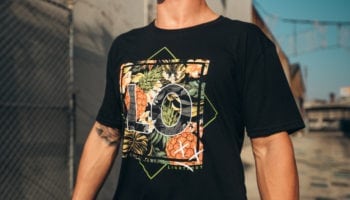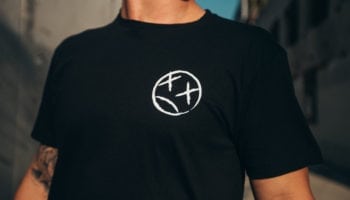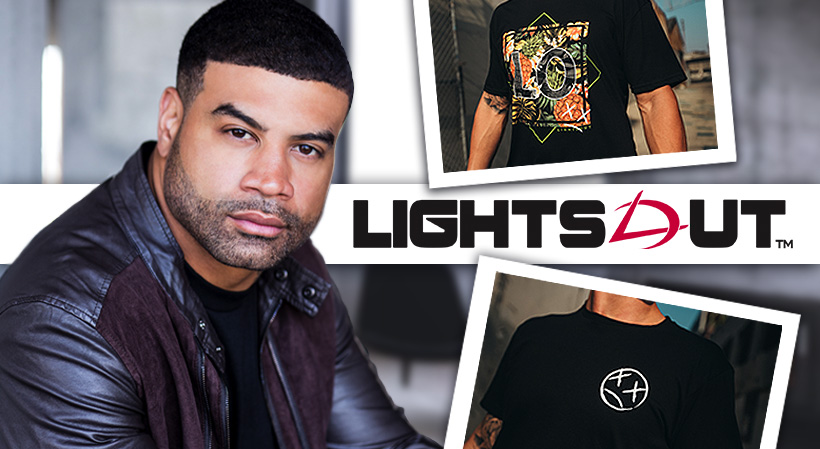If you’re a fan of NFL football like myself, then Shawne Merriman needs no introduction: a former three-time All-Pro and three-time Pro Bowl linebacker for the (then) San Diego Chargers. What you may not know, however, is that Merriman is now an entrepreneur, media personality and founder and CEO of an apparel brand, aptly named Lights Out.
Merriman has kept busy since retiring from professional football in March of 2013. In 2018 alone, he played a role in a film, worked as a TV sports analyst, and even participated in a bare knuckle boxing match.
StartupNation had the opportunity to talk to the former NFL star about life after football, entrepreneurship, how athletics prepared him for the world of business and more. Check out our exclusive interview with Merriman below.
How has football helped you become an entrepreneur? What lessons did the sport teach you that you’ve carried over to the business world?
You know, football especially (and sports in general, but definitely football) did a couple things for me. It taught me discipline, work ethic and how to overcome adversity and obstacles.
Finding ways to win — that’s no different than business. That’s no different than building a company or building a brand.
When you start out as an entrepreneur, nothing is 100 percent (guaranteed). Everything requires repetition and work. That’s what made me the football player that I was, and that’s what is working for me now in business.
You have carried the “Lights Out” nickname since high school. Was that an easy choice for your apparel brand name? Did you consider any other names?
You know, I’ve carried this name since I was 16-years-old. I carried it through high school, then I carried in college, then I carried it through the pros where it kind of put me in the national spotlight. Back when I was in high school, things like YouTube and social media weren’t really big yet, so all of this stuff was really a myth, like ‘Oh my gosh, did he really knock out four guys in one game?’ Yes, that’s true. So, having a name like that was big, but I always felt like something like that was much bigger than just what I did on a football field. I thought that ‘Lights Out’ was more powerful and impactful than anything I could do within those 60 minutes in a football game.
So what I did in 2007 was, I went to buy the names and rights (to ‘Lights Out’) from a company called Loomworks and P.J. Salvage in Irvine (California). Really big company, but I felt that I should own my name and own the rights, so I bought it and everything from this company. I didn’t know anything about the apparel industry at all; I just knew that I wanted to get the name out there because it was bigger than it being just about Shawne Merriman.
The only thing I knew a little bit about, but not much, was T-shirts. What if I started to put (‘Lights Out’) on T-shirts? So, three of my friends who were all living with me at the time, were all really good at (Adobe) Illustrator and PhotoShop and things like that. So they helped me put together the graphics for ‘Lights Out’ and we put them on T-shirts when I was playing for the (at the time) San Diego Chargers. Then we sold them and they blew up, I mean it literally blew up. So that’s how the brand started.

How involved are you with the company? What are some of the advantages to managing a smaller team and what are some of the challenges that come along with that?
We’re a pretty small team. I have about eight employees. One is a full-time, in-house designer, and one person that’s running operations. I have people in the warehouse and in e-commerce. So, you know, we’re pretty small, but I really like it that way because I can maneuver fast, which a lot of big companies can’t do. We can see something very catchy or something that’s hot at that current moment, and we can go with it. We don’t have 20 different layers of people making decisions — all of the decisions are coming from me.
….(I’m always busy) and what I found in the past year-and-a-half is that what was working best for the company was licensing. I learned about licensing over the course of the years, but I didn’t really understand how to partner and get with the right people to license it and grow Lights Out until this past year-and-a-half.
Related: How This Detroit Startup Built a Company to Keep Athletes Safer
What is next for the Lights Out brand? What are your plans for growth?
What I am now looking for is a strategic partner for growing the brand and growing the company. Opening my network to a company or business or social media platform. I have a pretty strong following across social media, so what I’ve been able to do is partner up and find companies, and I continue to search for these companies and people who believe Lights Out can be the next level.
To me, Lights Out is the Walt Disney of sports phrases. How many times are you sitting around watching TV and you hear somebody, a broadcaster or anybody, saying ‘lights out?’ I mean, you hear ‘lights out’ all the time in sports, and it just so happens to be a name I’ve carried on for years. But with the right strategic partner, and partnering up with the right people, I look to grow the business to far beyond what I thought it was when I bought the name and rights at 21-years-old. Now I have the opportunity to take Lights Out and make it a big national and international brand. This was the vision when I was 21-years-old, but I just didn’t quite understand the business then. I knew that I wanted to do something, but I didn’t know exactly how to go about it. But I knew I wanted to start, and I started with apparel.
What are the goals for the Lights Out brand?
The next step for me is finding the next company or the next person to bring into Lights Out who can really take us to the next level. It’s really searching for that strategic partner. You want somebody that has the same vision. That same vision and same passion that I carry. I wake up at 6:30 in the morning and I just go. I have that same feeling about Lights Out as I did when I played football and was running out to 70,000 people screaming and cheering. That’s how I feel about Lights Out on a daily basis. Partnering with the right people, and having the right people in your company and under your umbrella, is everything. If you bring the wrong people in who don’t understand the vision, and don’t have the same passion and drive as you do, then it’s really a lost cause.
What is the best advice you’ve ever received, either as an entrepreneur or an athlete, and how do you still use that advice today?
The best advice I’ve received was to find somebody in business who has been successful at what you’re trying to do — because they’ve already made those mistakes (and know how to correct them). For example, I didn’t know the price of T-shirts. I didn’t know while I was creating these T-shirts if I was supposed to sell them for $10, $15, $20, I had no idea. I made some mistakes early on, but I quickly found out that you can get with people in the business who have been there and done that because they’ve already made those mistakes. And those mistakes could be costly — not just for money, but also your time. So, find someone that, if they will allow you to, get around them and get as much information as you can. Become a sponge. That’s going to shave off years of mistakes, and shave off years in time and function and headaches. It will help you get through the growing pains of learning business.
I’ve been very fortunate, because of what I was able to do on the field, I’ve been able to get in contact with some of the best businessmen and best people in the industry that helped guide me along the way. I appreciate the help. I would attend meetings, and seminars and things like that with them, and it catapulted me and saved me five or seven years. Because of that, at 34-years-old, I’m able to license out a company like Lights Out. You know, I was a football player, I was an athlete my entire life. Now, I understand licensing and I can talk about intellectual property, trademark and trademark infringement. My experience in being in this field, and my willingness to learn, catapulted me and saved me (valuable) time.
On the flip side, if you had one piece of advice for someone looking to start their own business, what would it be?
Commit. Being an entrepreneur, you’re going to fail (at points). Start anything new, you’re going to fail, and you’re going to fail badly. Take a minute, because in that failure, on the other side of it is a wealth of failure and intelligence that you pick up. I was told early on by most retail places that Lights Out wasn’t good enough or wasn’t for their retail. Instead of tucking my tail between my legs and turning around, I just went back and upgraded the product with a set of higher-quality designers and brought in a better team. I went back at it and I finally made into retail about two years ago. But for a year, I couldn’t figure out the retail (side of things). I used to sit around with my sales reps a couple of years ago and I said, ‘Explain to me the business,’ because they’ve been in the business for 10 to 15 years, and I would sit them down and ask them to tell me everything from start to finish.
Same thing with my warehouse (team) and e-commerce (team) and people that were around me. Look, I played football and sports my entire life. There was no way for me to have the type of (industry) knowledge just leaving the game and trying to learn everything within a couple of years. (Competitors) have been doing it for 10 or 20 years or so. So, all of the people that I hired and was paying to run the business, I would sit down with them and have them explain the business to me (and that’s how I learned).

What are the similarities between athletics and business?
Ahh, man. For example, in my case, (I would compare business to) having an injury and trying to overcome that injury, and trying to get back in the game. In business, like I said, you’re going to fail. You’re going to have some things that don’t go right. You’re going to have things that can easily make you want to quit. You are going to sit around some days and say to yourself, ‘Why am I doing this? Is this what I really want to do? Why am I trying so hard?’ You have to overcome those obstacles and that adversity and stay with it. That’s the closest similarity that I took away, outside of dedication, discipline, practice and things like that. We’re talking about the sheer fact that overcoming obstacles that you have to deal with in business is no different than you coming back from an ankle, knee, back, hand or shoulder injury.
It’s the same thing that runs through your head as an athlete when you’re trying to overcome an injury, getting back out there and getting back to what you were doing. It’s no different in business.
Sign Up: Receive the StartupNation newsletter!
Is there anything else about the brand or yourself you would like our readers to know?
We have a really big announcement coming up with Lights Out. I am looking to bring in the right people and partner with the right companies with Lights Out. That’s my main goal right now — to bring in a powerhouse of people who are just as hungry as I am. That’s how I feel about Lights Out and I am not going to stop until I hit that (goal).
If you are interested in purchasing merchandise from Lights Out, you can find the apparel online or in Tillys stores. The brand is sold in 300 stores total across the U.S. Follow Shawne on Twitter and Instagram, or like him on Facebook to keep up with his endeavors. You can find Lights Out on Twitter, Facebook and Instagram, as well.






